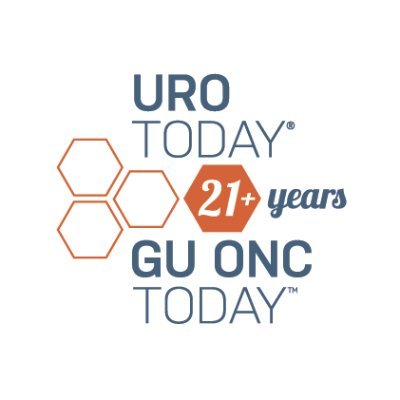
Jacob Berchuck
@jberchuck
Followers
912
Following
52K
Media
68
Statuses
260
Medical Oncologist and Physician-Scientist at @EmoryMedicine & @WinshipAtEmory. Learn more about our work @ https://t.co/TP4Vcq7oXF
Boston
Joined April 2009
🚀 Excited to share that I’ve joined @EmoryMedicine & @WinshipAtEmory to launch The Berchuck Lab. Our research is focused on using liquid biopsy to improve outcomes for people living with cancer. We’re hiring for several key roles! Learn more & apply:
5
21
117
🧬 Our Play-Doh vision for a futuristic prostate cancer therapy at the @PCF_Science Young Investigator Retreat… an all-in-one CAR-T model targeting PSMA, STEAP2, CD46, KLK2, and B7-H3 💪 #PCFRetreat25 #table12
2
3
17
🚨 Check out our new post in @ASCO Daily News 🔎Exploring emerging paradigms transforming metastatic hormone-sensitive prostate cancer care - from novel systemic therapies to personalized strategies. A shift in practice is underway!! @jberchuck @EHeath4100 & Dr. Brad Carthon
dailynews.ascopubs.org
The treatment of metastatic hormone-sensitive prostate cancer has evolved rapidly, with the emergence of doublet and triplet therapies transforming outcomes. However, these advances bring new...
1
1
7
🚨 Excited to share our manuscript in @Nature_NPJ highlighting the expanding role of liquid biopsy to detect clinically actionable non-genomic mechanisms of therapeutic resistance. Led by @KarlSemaan @RashadNawfal with collaborators @SylvanBacaLab @DrChoueiri #MattFreedman.
1/ Happy to share our latest piece in @Nature_NPJ precision oncology: "Plasma epigenomic profiling reveals treatment-emergent squamous transformation in prostate cancer". Work co-led with @KarlSemaan with great mentorship from @Jberchuck @SylvanBacaLab #MattFreedman @DrChoueiri
1
2
16
Plasma epigenomic profiling to reveal molecular correlates of response and resistance to 177Lu-PSMA-617 in #mCRPC. Presentation by @jberchuck @EmoryMedicine. #ASCO25 written coverage by @RKSayyid @USC > https://t.co/d6FWRFHNGZ
@ASCO
0
4
7
Winship medical oncologist Jacob E. Berchuck, MD recently spoke with @targetedonc on how a new epigenomic platform may influence the accessibility of prostate-specific membrane antigen-based therapies. ➡️ https://t.co/5EPsD0eTYg
0
5
9
Data presented at #ISLB24 suggest that epigenomic cfDNA may accurately assess PSMA expression and predict Lu-PSMA response in mCRPC. @jberchuck @emory_urology #pcsm
https://t.co/JfiuvR5KnC
urologytimes.com
“Our study highlights the potential of epigenomic profiling from a simple blood draw to provide a real-time, non-invasive readout of PSMA expression that corresponds with treatment response," says...
0
1
2
Honored to be awarded best poster at the @isliquidbiopsy #ISLB24 Annual Congress for our work using a novel epigenomic liquid biopsy platform to detect PSMA expression and predict Pluvicto response in mCRPC. CC: fantastic collaborators @PrafulRavi1 @HJacene @Precede_Bio
2
11
73
Thank you @isliquidbiopsy for the opportunity to speak on the potential of liquid biopsies for early cancer detection at #ISLB24. Congrats to @ChristianRolfo and co for organizing a fantastic conference!
Session on liquid biopsy for early cancer detection #ISLB24
@ChristianRolfo @ValsamoA @jberchuck and great to hear about hereditary cancer advancements @PughLab
0
6
22
Fantastic @CCR_AACR Translations piece from @jberchuck & colleagues on our recent @CCR_AACR paper uncovering a stemness signature enriched in cfDNA in lethal AR-altered prostate cancer patients. @pradeep198212 @MayoRadOnc @MayoCancerCare @MayoClinic
https://t.co/Bvhp54J0Lo
0
4
14
📊 Revolutionary approach: Analyzing cell-free DNA to track PSMA expression in real-time. Dr. Jake Berchuck (@jberchuck) discusses how this could transform treatment decisions in prostate cancer. Watch the complete discussion on @urotoday: https://t.co/sducE8whNc
0
4
18
Novel epigenomic liquid biopsy detects PSMA expression in #ProstateCancer. @jberchuck @WinshipAtEmory and Oliver Sartor, MD @MayoClinic dive into this cutting-edge epigenomic liquid biopsy platform that uses cell-free DNA to infer PSMA expression. This novel assay shows a strong
0
4
8
Challenging prostate cancer subtypes like liver metastases and neuroendocrine #prostatecancer may ultimately benefit from more precise treatment approaches, thanks to innovative liquid biopsy technology. @sartor_oliver & @jberchuck discuss on @urotday- https://t.co/n6Bqp3hcNL
0
3
9
WATCH: Jacob E. Berchuck, MD, discusses research behind using a blood-based liquid biopsy over traditional PSMA PET scans presented at #ESMO24. @jberchuck @EmoryMedicine @WinshipAtEmory
https://t.co/hnHI1eJq6y
targetedonc.com
Jacob E. Berchuck, MD, discusses research behind using a blood-based liquid biopsy over traditional PSMA PET scans presented at the 2024 ESMO Congress.
0
1
3
7/ 🎯 We conclude that the SigMA HRD mutational signature could help refine the population of mCRPC patients who may benefit from PARPi. Larger studies are needed for further validation. Stay tuned!
0
0
2
6/ 👴🏻 We highlight a patient lacking an HR gene alteration but classified as HRD by SigMA who experienced a 64% reduction in PSA and 11-month rPFS on olaparib, suggesting the potential clinical utility of SigMA to identify PARPi responders in mCRPC.
1
0
2
5/ 📊 We found that SigMA-predicted HRD was a stronger predictor of response to olaparib than the list of HR gene alterations in the FDA label. On multivariate analysis, SigMA-predicted HRD was associated with improved PSA-PFS and rPFS to olaparib.
1
0
0
4/ 🧪 In our cohort of 546 prostate tumors from @DanaFarber, 34% had SigMA-predicted HRD, which strongly associated with BRCA2 alts. HRD was also detected in 31% of tumors without HR alterations, suggesting the potential to capture a broader set of responders to PARPi in mCRPC.
1
0
0
3/ 🖥️ SigMA is a computational tool developed by @dcgulhan that detects HRD signatures from targeted gene panel sequencing data. In ovarian cancer, SigMA identifies HRD in some patients even when HR alterations aren’t present. Our study brings this approach to prostate cancer.
1
0
0
2/ 💡 PARPi are approved for mCRPC patients with HR gene alterations, but response to PARPi can vary. Can mutational signatures be a better predictor of response to PARPi in mCRPC? We aimed to find out!
1
0
0
1/ 🔈Excited to share our latest publication “A panel-based mutational signature of HRD associates with response to PARP inhibition in mCRPC” led by #danielboiarsky @aloktewar @dcgulhan. 🧵Below… 📄Read the full paper here: https://t.co/yxqVCHYZim
1
1
3












